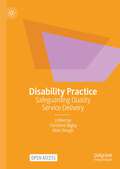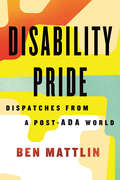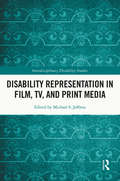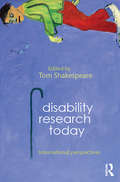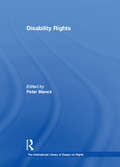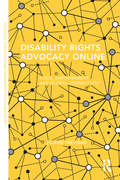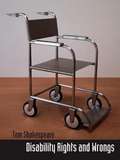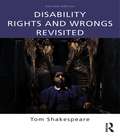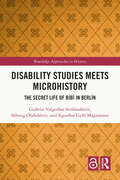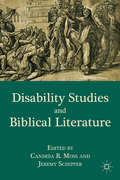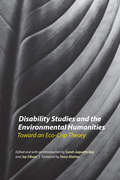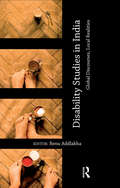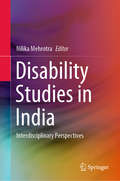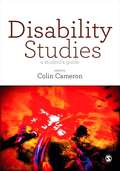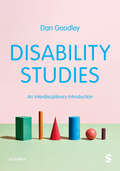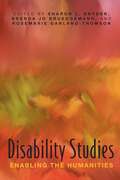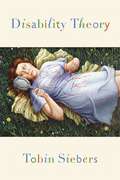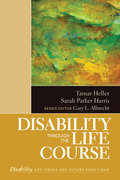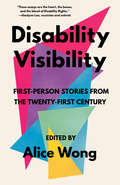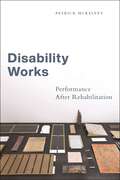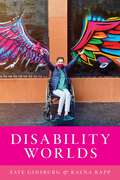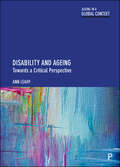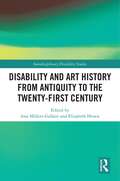- Table View
- List View
Disability Practice: Safeguarding Quality Service Delivery
by Christine Bigby Alan HoughThis open access book critically engages with the social, political and ethical implications of support for people with disability to be fully included in society. The authors examine contemporary issues of quality and safeguarding in disability services, translating research and practice wisdom into foundational knowledge. Written by leading researchers, the book provides a comprehensive overview of knowledge and practice necessary to prepare readers to deliver enabling support.
Disability Pride: Dispatches from a Post-ADA World
by Ben MattlinAn eye-opening portrait of the diverse disability community as it is today, and how disability attitudes, activism, and representation have evolved since the passage of the Americans with Disabilities Act (ADA)In Disability Pride, disabled journalist Ben Mattlin weaves together interviews and reportage to introduce a cavalcade of individuals, ideas, and events in engaging, fast-paced prose. He traces the generation that came of age after the ADA reshaped America, and how it is influencing the future. He documents how autistic self-advocacy and the neurodiversity movement upended views of those whose brains work differently. He lifts the veil on a thriving disability culture—from social media to high fashion, Hollywood to Broadway—showing how the politics of beauty for those with marginalized body types and facial features is sparking widespread change.He also explores the movement&’s shortcomings, particularly the erasure of nonwhite and LGBTQIA+ people that helped give rise to Disability Justice. He delves into systemic ableism in health care, the right-to-die movement, institutionalization, and the scourge of subminimum-wage labor that some call legalized slavery. And he finds glimmers of hope in how disabled people never give up their fight for parity and fair play.Beautifully written, without anger or pity, Disability Pride is a revealing account of an often misunderstood movement and identity, an inclusive reexamination of society&’s treatment of those it deems different.
Disability Representation in Film, TV, and Print Media (Interdisciplinary Disability Studies)
by Michael S. JeffressUsing sources from a wide variety of print and digital media, this book discusses the need for ample and healthy portrayals of disability and neurodiversity in the media, as the primary way that most people learn about conditions. It contains 13 newly written chapters drawing on representations of disability in popular culture from film, television, and print media in both the Global North and the Global South, including the United States, Canada, India, and Kenya. Although disability is often framed using a limited range of stereotypical tropes such as victims, supercrips, or suffering patients, this book shows how disability and neurodiversity are making their way into more mainstream media productions and publications with movies, television shows, and books featuring prominent and even lead characters with disabilities or neurodiversity. Disability Representation in Film, TV, and Print Media will be of interest to all scholars and students of disability studies, cultural studies, film studies, gender studies, and sociology more broadly.
Disability Research Today: International Perspectives
by Tom ShakespeareGrouped around four central themes – illness and impairment, disabling processes, care and control, and communication and representations – this collection offers a fresh perspective on disability research, showing how theory and data can be brought together in new and exciting ways. Disability Research Today starts by showing how engaging with issues around illness and impairment is vital to a multidisciplinary understanding of disability as a social process. The second section explores factors that affect disabled people, such as homelessness, violence and unemployment. The third section turns to social care, and how disabled people are prevented from living with independence and dignity. Finally, the last section examines how different imagery and technology impacts our understandings of disability and deafness. Showcasing empirical work from a range of countries, including Japan, Norway, Italy, Australia, India, the UK, Turkey, Finland and Iceland, this collection shows how disability studies can be simultaneously sophisticated, accessible and policy-relevant. Disability Research Today is suitable for students and researchers in disability studies, sociology, social policy, social work, nursing and health studies.
Disability Rights (The International Library of Essays on Rights)
by Peter BlanckThere is great diversity of definitions, causes and consequences of discrimination against persons with disabilities, yet there are fundamental themes uniting countries in their pursuit of human rights policies to improve the social and economic status of those with disabilities. In this volume are twenty-five important articles examining historical, contemporary and comparative issues crucial to the advancement of disability rights. The volume foreshadows the future of disability rights as a medium for ensuring that those living with disabilities participate as equal citizens of the world.
Disability Rights Advocacy Online: Voice, Empowerment and Global Connectivity (Routledge Studies in Global Information, Politics and Society)
by Filippo TrevisanDisability rights advocates in the United Kingdom and the United States recently embraced new media technologies in unexpected and innovative ways. This book sheds light on this process of renewal and asks whether the digitalisation of disability rights advocacy can help re-configure political participation into a more inclusive experience for disabled Internet users, enhancing their stakes in democratic citizenship. Through the examination of social media content, Web link analysis, and interviews with leading figures in grassroots groups on both sides of the Atlantic, Filippo Trevisan reveals the profound impact that the Internet has had on disability advocacy in the wake of the austerity agenda that followed the 2008 global financial crisis. In Britain, a new, tech-savvy generation of young disabled self-advocates has emerged from this process. The role of social media platforms such as Facebook in helping politically inexperienced users make sense of complex policy changes through the use of personal stories is discussed also. In addition, this book explains why British disability advocates adopted more innovative and participatory strategies compared to their American counterparts when faced with similar policy crises. This book reviews the implications of this unexpected digital transformation for the structure of the disability rights movement, its leadership, and the opportunity for disabled citizens to participate fully in democratic politics vis-à-vis persisting Web access and accessibility barriers. An original perspective on the relationship between disability and the Internet, and an indispensable read for scholars wishing to contextualize and enrich their knowledge on digital disability rights campaigns vis-à-vis the broader ecology of policymaking.
Disability Rights and Wrongs
by Tom ShakespeareOver the last thirty years, the field of disability studies has emerged from the political activism of disabled people. In this challenging review of the field, leading disability academic and activist Tom Shakespeare argues that the social model theory has reached a dead end. Drawing on a critical realist perspective, Shakespeare promotes a pluralist, engaged and nuanced approach to disability. Key topics discussed include: dichotomies - the dangerous polarizations of medical model versus social model, impairment versus disability and disabled people versus non-disabled people identity - the drawbacks of the disability movement's emphasis on identity politics bioethics in disability - choices at the beginning and end of life and in the field of genetic and stem cell therapies care and social relationships - questions of intimacy and friendship. This stimulating and accessible book challenges orthodoxies in British disability studies, promoting a new conceptualization of disability and fresh research agenda. It is an invaluable resource for researchers and students in disability studies and sociology, as well as professionals, policy makers and activists.
Disability Rights and Wrongs
by Tom ShakespeareBringing together Tom Shakespeare's innovative work from over the past ten years, 'Disability Rights and Wrongs' presents an analysis of the key issues in disability studies. The text examines issues such as biological and social factors, the challenge to medicine and genetics, rhetoric and empowerment.
Disability Rights and Wrongs Revisited
by Tom ShakespeareOver the last forty years, the field of disability studies has emerged from the political activism of disabled people. In this challenging review of the field, leading disability academic and activist Tom Shakespeare argues that disability research needs a firmer conceptual and empirical footing. This new edition is updated throughout, reflecting Shakespeare’s most recent thinking, drawing on current research, and responding to controversies surrounding the first edition and the World Report on Disability, as well as incorporating new chapters on cultural disability studies, personal assistance, sexuality, and violence. Using a critical realist approach, Disability Rights and Wrongs Revisited promotes a pluralist, engaged and nuanced approach to disability. Key topics discussed include: dichotomies – going beyond dangerous polarizations such as medical model versus social model to achieve a complex, multi-factorial account of disability identity - the drawbacks of the disability movement's emphasis on identity politics bioethics - choices at the beginning and end of life and in the field of genetic and stem cell therapies relationships – feminist and virtue ethics approaches to questions of intimacy, assistance and friendship. This stimulating and accessible book challenges disability studies orthodoxy, promoting a new conceptualization of disability and fresh research agenda. It is an invaluable resource for researchers and students in disability studies and sociology, as well as professionals, policy makers and activists.
Disability Studies Meets Microhistory: The Secret Life of Bíbí in Berlín (ISSN)
by Sigurður Gylfi Magnússon Guðrún Valgerður Stefánsdóttir Sólveig ÓlafsdóttirThis volume explores the life of Bjargey “Bíbí” Kristjánsdóttir (1927–1999), an Icelandic woman with intellectual disabilities, through analysis of her autobiography and personal archive on the basis of the research disciplines of critical disability studies and microhistory.Bíbí, who grew up in northern Iceland on a small farm called Berlin, fell ill when she was in her first year and was afterward labeled "feeble-minded" by her family and the local community. When Bíbí died, she had finished a 145,000-word autobiography which she had written alone and kept secret from her family and neighbors, very few of whom even knew that she could read and write. This book aims to consider Bíbí’s life through her autobiography and other historical sources she created, to identify how various historical, social, and cultural factors interacted and influenced her circumstances. It explores Bíbí’s agency, and how she managed to play her cards within the narrow scope given to her by society. What makes Bíbí’s history extraordinary is precisely the direct connection to her world through her counter-archive.This book provides students and scholars of the humanities and the social sciences with a new way of critical thinking about both disciplines.
Disability Studies and Biblical Literature
by Jeremy Schipper Candida R. MossThe primary aim of this volume is to synthesize the two fields of disability studies and biblical studies. It illustrates how academic or critical biblical scholarship has shown that many texts involving disability in the Bible is much more nuanced than a casual reading or isolated proof texting may indicate.
Disability Studies and the Environmental Humanities: Toward an Eco-Crip Theory
by Stacy Alaimo Sarah Jaquette Ray Jay SibaraAlthough scholars in the environmental humanities have been exploring the dichotomy between “wild” and “built” environments for several years, few have focused on the field of disability studies, a discipline that enlists the contingency between environments and bodies as a foundation of its scholarship. On the other hand, scholars in disability studies have demonstrated the ways in which the built environment privileges some bodies and minds over others, yet they have rarely examined the ways in which toxic environments engender chronic illness and disability or how environmental illnesses disrupt dominant paradigms for scrutinizing “disability.” Designed as a reader for undergraduate and graduate courses, Disability Studies and the Environmental Humanities employs interdisciplinary perspectives to examine such issues as slow violence, imperialism, race, toxicity, eco-sickness, the body in environmental justice, ableism, and other topics. With a historical scope spanning the seventeenth century to the present, this collection not only presents the foundational documents informing this intersection of fields but also showcases the most current work, making it an indispensable reference.
Disability Studies in India: Global Discourses, Local Realities
by Renu AddlakhaSince the 1970s, the international disability rights movement, the United Nations and national governments across the world have attempted to ameliorate the status of the disabled population through a range of legislative and policy measures primarily in the areas of health, education, employment, accessible environments and social security. While the discourse in the disability sector in India has shifted from charity and welfare to human rights and entitlements, disability studies — as an interdisciplinary academic terrain that focuses on the contributions, experiences, history and culture of persons with disabilities — has not yet taken root.This volume collates some of the most recent pioneering work on disability studies from across the country. The essays presented here engage with the concept of disability from a variety of disciplinary positions, sociocultural contexts and subjective experiences within the overarching framework of the Indian reality. The contributors — including some with disabilities themselves — provide a well-rounded perspective, in shifting focus from disability as a medical condition only needing clinical intervention to giving it due social and academic legitimacy.This book outlines key issues that would be germane to any disability studies endeavour in India and South Asia, and will appeal to academics, activists, institutions, laypersons and professionals involved in social welfare, sociology, disability studies, women’s studies, psychiatry, rehabilitation, and social and preventive medicine.
Disability Studies in India: Interdisciplinary Perspectives
by Nilika MehrotraThis book examines the state of art in disability studies, focusing on the Indian context, as well as the broader South Asian situation. It presents interdisciplinary perspectives on the basic idea, evolution, practices and challenges of researching and teaching disability studies at various higher education institutions and in other civil society spaces. The chapters address a range of related themes, including activism, development policies, research, pedagogy, spatial and social access, caste and gender representations and rights-based discourses. Given the scope of its coverage, the book is of interest to scholars and students in area of humanities, education, law, sociology and social work, political science development and disability studies.
Disability Studies: A Student's Guide
by Colin CameronThis textbook brings together a wide range of expert voices from the field of disability studies and the disabled people's movement to tackle the essential topics relevant to this area of study. From the outset disability is discussed from a social model perspective, demonstrating how future practice and discourse could break down barriers and lead to more equal relationships for disabled people in everyday life. An interdisciplinary and broad-ranging text, the book includes 50 chapters on topics relevant across health and social care. Reflective questions and suggestions for further reading throughout will help readers gain a critical appreciation of the subject and expand their knowledge. This will be valuable reading for students and professionals across disability studies, health, nursing, social work, social care, social policy and sociology.
Disability Studies: An Interdisciplinary Introduction
by Dan GoodleyWhat if disability isn′t a problem but a resource? This updated edition of a classic text in the field of disability studies interrogates the commonly held view that disability is something that needs to be ′cured′ or ′eradicated′. It shows us how disability can challenge our thinking and help us to imagine a more socially just society, offering an engaging introduction to a diverse and globally expanding subject. Taking an interdisciplinary approach, this text will be of interest to undergraduates, graduates, and researchers across the social sciences. Making the case that disability is much more than just impairment, this book uncovers the ways in which disabled people are challenging discrimination and marginalisation. Ranging across topics such as health, activism and education, this book asks questions about the ways in which society tends to understand disability and offers alternative explanations that are more exciting, radical and transformative.
Disability Studies: An Interdisciplinary Introduction
by Dan GoodleyWhat if disability isn′t a problem but a resource? This updated edition of a classic text in the field of disability studies interrogates the commonly held view that disability is something that needs to be ′cured′ or ′eradicated′. It shows us how disability can challenge our thinking and help us to imagine a more socially just society, offering an engaging introduction to a diverse and globally expanding subject. Taking an interdisciplinary approach, this text will be of interest to undergraduates, graduates, and researchers across the social sciences. Making the case that disability is much more than just impairment, this book uncovers the ways in which disabled people are challenging discrimination and marginalisation. Ranging across topics such as health, activism and education, this book asks questions about the ways in which society tends to understand disability and offers alternative explanations that are more exciting, radical and transformative.
Disability Studies: Enabling the Humanities
by Brenda Jo Brueggemann Sharon L. Snyder Rosemarie Garland-ThomsonImages of disability pervade language and literature, yet disability is, as the volume's introduction notes, "the ubiquitous unspoken topic in contemporary culture." The twenty-five essays in Disability Studies provide perspectives on disabled people and on disability in the humanities, art, the media, medicine, psychology, the academy, and society.Edited and introduced by Sharon L. Snyder, Brenda Jo Brueggemann, and Rosemarie Garland-Thomson and containing an afterword by Michael Bérubé (author of Life As We Know It), the volume is rich in its cast of characters (including John Bulwer, Teresa de Cartagena, Audre Lorde, Oliver Sacks, Samuel Johnson, Mark Twain, Walt Whitman); in its powerful, authentic accounts of disabled conditions (deafness, blindness, MS, cancer, the absence of limbs); in its different settings (ancient Greece, medieval Spain, Nazi Germany, the modern United States); and in its mix of the intellectual and the emotional, of subtle theory and plainspoken autobiography.
Disability Theory
by Tobin Siebers"Disability Theory is just the book we've been waiting for. Clear, cogent, compelling analyses of the tension between the 'social model' of disability and the material details of impairment; of identity politics and unstable identities; of capability rights and human interdependence; of disability and law, disability as masquerade, disability and sexuality, disability and democracy---they're all here, in beautifully crafted and intellectually startling essays. Disability Theory is a field-defining book: and if you're curious about what 'disability' has to do with 'theory,' it's just the book you've been waiting for, too." ---Michael Bérubé, Pennsylvania State University. "Disability Theory is magisterially written, thoroughly researched, and polemically powerful. It will be controversial in a number of areas and will probably ruffle feathers both in disability studies as well as in realms of cultural theory. And that's all to the good." ---Michael Davidson, University of California, San Diego. "Not only is Disability Theory a groundbreaking contribution to disability studies, it is also a bold, ambitious and much needed revision to a number of adjacent and overlapping fields including cultural studies, literary theory, queer theory, and critical race studies. Siebers has written a powerful manifesto that calls theory to account and forces readers to think beyond our comfort zones." ---Helen Deutsch, University of California, Los Angeles. Intelligent, provocative, and challenging,Disability Theory revolutionizes the terrain of theory by providing indisputable evidence of the value and utility that a disability studies perspective can bring to key critical and cultural questions. Tobin Siebers persuasively argues that disability studies transfigures basic assumptions about identity, ideology, language, politics, social oppression, and the body. At the same time, he advances the emerging field of disability studies by putting its core issues into contact with signal thinkers in cultural studies, literary theory, queer theory, gender studies, and critical race theory. Tobin Siebers is V. L. Parrington Collegiate Professor, Professor of English Language and Literature, and Professor of Art and Design at the University of Michigan.
Disability Through the Life Course
by Professor Tamar Heller Sarah K. Parker HarrisThis volume in The SAGE Reference Series on Disability explores issues involving disability through the life courses, and is one of eight volumes in the cross-disciplinary and issues-based series, which examines topics central to the lives of individuals with disabilities and their families. With a balance of history, theory, research, and application, specialists set out the findings and implications of research and practice for others whose current or future work involves the care and/or study of those with disabilities, as well as for the disabled themselves. The concise, engaging presentational style emphasizes accessibility. Taken individually, each volume sets out the fundamentals of the topic it addresses, accompanied by compiled data and statistics, recommended further readings, a guide to organizations and associations, and other annotated resources, thus providing the ideal introductory platform and gateway for further study. Taken together, the series represents both a survey of major disability issues and a guide to new directions and trends and contemporary resources in the field as a whole.
Disability Visibility: First-Person Stories from the Twenty-First Century
by Alice Wong&“Disability rights activist Alice Wong brings tough conversations to the forefront of society with this anthology. It sheds light on the experience of life as an individual with disabilities, as told by none other than authors with these life experiences. It's an eye-opening collection that readers will revisit time and time again.&” —Chicago TribuneOne in five people in the United States lives with a disability. Some disabilities are visible, others less apparent—but all are underrepresented in media and popular culture. Activist Alice Wong brings together this urgent, galvanizing collection of contemporary essays by disabled people, just in time for the thirtieth anniversary of the Americans with Disabilities Act,From Harriet McBryde Johnson&’s account of her debate with Peter Singer over her own personhood to original pieces by authors like Keah Brown and Haben Girma; from blog posts, manifestos, and eulogies to Congressional testimonies, and beyond: this anthology gives a glimpse into the rich complexity of the disabled experience, highlighting the passions, talents, and everyday lives of this community. It invites readers to question their own understandings. It celebrates and documents disability culture in the now. It looks to the future and the past with hope and love.
Disability Works: Performance After Rehabilitation (Performance and American Cultures #8)
by Patrick McKelveyA cultural history of disability, performance, and work in the modern United StatesIn 1967, the US government funded the National Theatre of the Deaf, a groundbreaking rehabilitation initiative employing deaf actors. This project aligned with the postwar belief that transforming bodies, minds, aesthetics, and institutions could liberate disabled Americans from economic reliance on the state, and demonstrated the growing optimism that performance could provide job opportunities for people with disabilities.Disability Works offers an original cultural history of disability and performance in modern America, exploring rehabilitation’s competing legacies. The book highlights an unexpected alliance of rehabilitation professionals, deaf teachers, policy makers, disability activists, queer artists, and religious leaders who championed performance’s rehabilitative potential. At the same time, some disabled artists imagined a different political itinerary for theatrical practice. Rather than acquiescing to the terms of productive citizenship, these artists recuperated rehabilitation as a creative resource for imagining and building a world beyond work. Using previously unexplored archives, Disability Works portrays the history of disabled Americans’ performance labor as both a national aspiration and a national problem. The book reveals how disabled artists and activists ingeniously used rehabilitative resources to fuel their performance practices, breaking free from the grasp of rehabilitation and fostering more just institutions.From state-funded “sign-mime” to Black modern dance, community theatre to Stanislavskian actor training, speculative activism to epistolary performance, Disability Works recovers an expansive repertoire of aesthetic and infrastructural investigations into the terms of how disability works in modern American culture.
Disability Worlds
by Faye Ginsburg Rayna RappIn Disability Worlds, Faye Ginsburg and Rayna Rapp chronicle and theorize two decades of immersion in New York City’s wide-ranging disability worlds as parents, activists, anthropologists, and disability studies scholars. They situate their disabled children’s lives among the experiences of advocates, families, experts, activists, and artists in larger struggles for recognition and rights. Disability consciousness, they show, emerges in everyday politics, practices, and frictions. Chapters consider dilemmas of genetic testing and neuroscientific research, reimagining kinship and community, the challenges of “special education,” and the perils of transitioning from high school. They also highlight the vitality of neurodiversity activism, disability arts, politics, and public culture. Disability Worlds reflects the authors’ anthropological commitments to recognizing the significance of this fundamental form of human difference. Ginsburg and Rapp’s conversations with diverse New Yorkers reveal the bureaucratic constraints and paradoxes established in response to the disability rights movement, as well as the remarkable creativity of disabled people and their allies who are opening pathways into both disability justice and disability futures.
Disability and Ageing: Towards a Critical Perspective (Ageing in a Global Context)
by Ann LeahyEstablishing a critical and interdisciplinary dialogue, this text engages with the typically disparate fields of social gerontology and disability studies. It investigates the subjective experiences of two groups rarely considered together in research – people ageing with long-standing disability and people first experiencing disability with ageing. This book challenges assumptions about impairment in later life and the residual nature of the ‘fourth age’. It proposes that the experience of ‘disability’ in older age reaches beyond the bodily context and can involve not only a challenge to a sense of value and meaning in life, but also ongoing efforts in response.
Disability and Art History from Antiquity to the Twenty-First Century (Interdisciplinary Disability Studies)
by Ann Millett-GallantThis volume analyzes representations of disability in art from antiquity to the twenty-first century, incorporating disability studies scholarship and art historical research and methodology. This book brings these two strands together to provide a comprehensive overview of the intersections between these two disciplines. Divided into four parts: Ancient History through the 17th Century: Gods, Dwarfs, and Warriors 17th-Century Spain to the American Civil War: Misfits, Wounded Bodies, and Medical Specimens Modernism, Metaphor and Corporeality Contemporary Art: Crips, Care, and Portraiture and comprised of 16 chapters focusing on Greek sculpture, ancient Chinese art, Early Italian Renaissance art, the Spanish Golden Age, nineteenth century art in France (Manet, Toulouse-Lautrec) and the US, and contemporary works, it contextualizes understandings of disability historically, as well as in terms of medicine, literature, and visual culture. This book is required reading for scholars and students of disability studies, art history, sociology, medical humanities and media arts.
